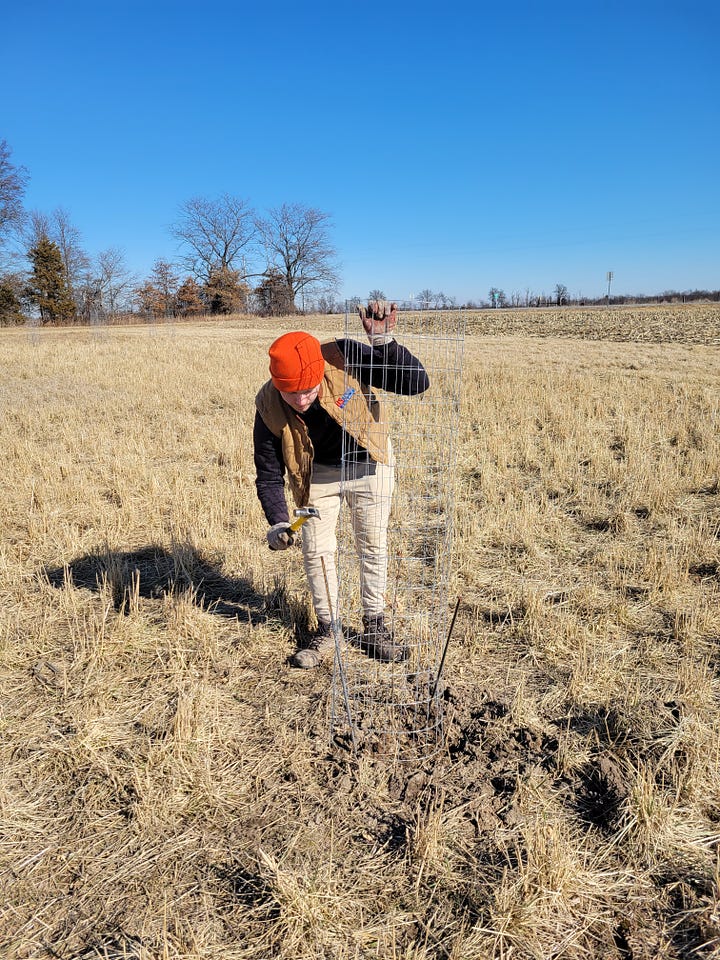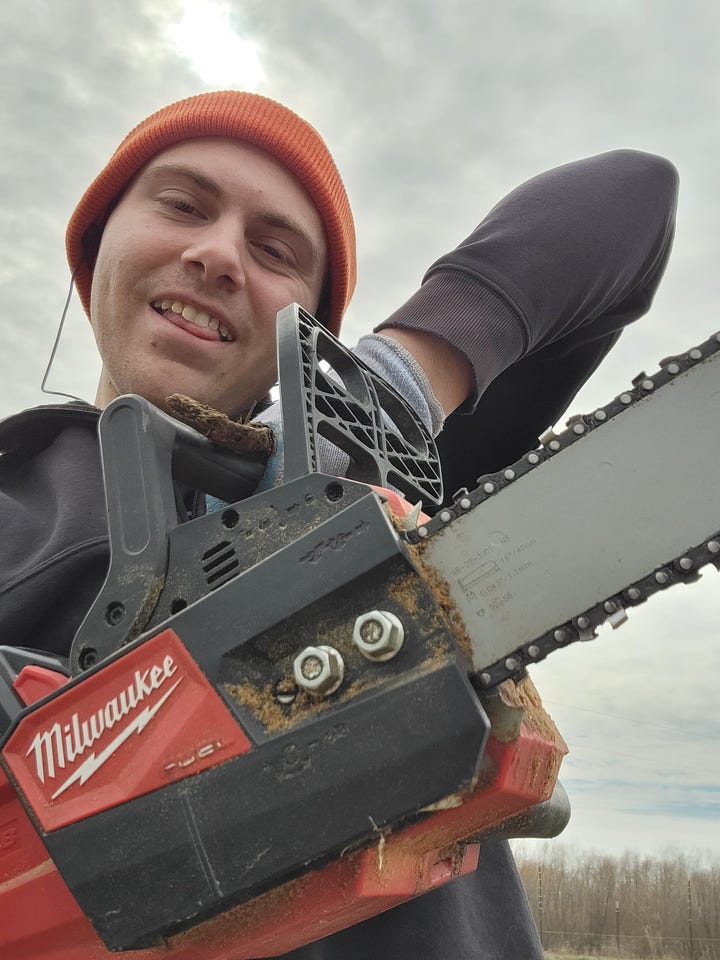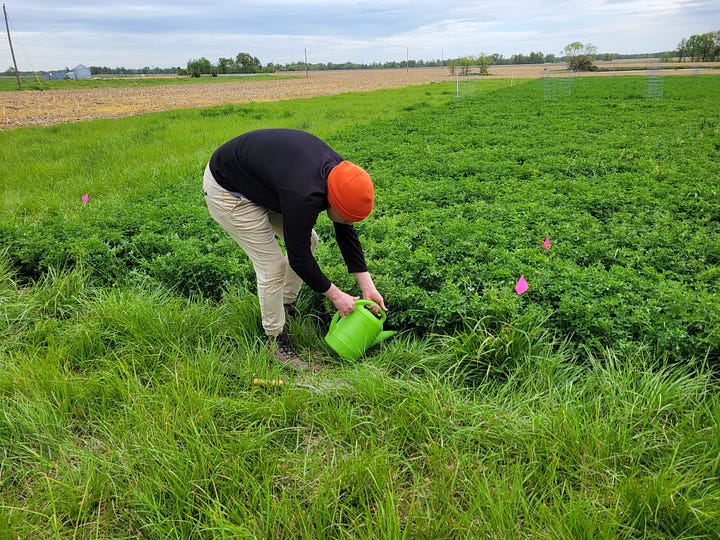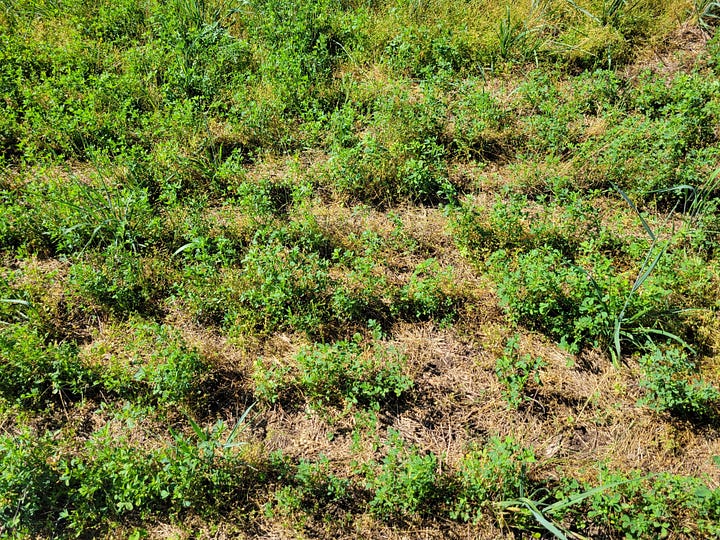A Graduate School Reflection
Eight days ago, I defended my thesis, "Intercropping Dynamics in a Perennial Kernza Cropping System." I am now in the process of revising my thesis and preparing manuscripts to submit to scientific journals. Soon, I will receive my Master of Science and leave academia (for now). Now that I'm entering a new stage of my life, I wanted to reflect on the last two years, how I've changed, and the value that I think grad school brought into my life.
Wait? I'm smart?
One of the greatest components of my personal growth during my time at the University of Missouri has been that I am starting to feel like I have actual expertise and insight. As I was finalizing my data and writing my thesis, I found myself making actual interpretations of the data I collected and fit it into the context of the existing literature. In undergrad, writing papers or working on research projects felt like collecting and describing others' ideas. I never felt like I was making specific contributions, simply packaging information. Over the past two years, however, I have developed a skillset and knowledge base to make contributions and insights.




For example, in one of my experiments, which looks at the nitrogen contributions of alfalfa mulch to Kernza, I found a higher level of fertilization in the fall than during the summer despite the bulk of the mulch having been applied at the beginning of the summer. Despite this somewhat confounding result, I immediately had several possible explanations for the delayed impact of the mulch. First, Kernza is quite conservative in its nitrogen uptake in the height of summer, as it does not create new root or shoot structures. The organism is focused on seed production, so it doesn't need much nitrogen. Another explanation I came up with was that being a drought year, the mulch would have been quite dry when applied to the field, leading to its breaking down and releasing nutrients much slower than during a typical, wetter summer. From either of these two effects or, more likely, a combination of the two, I was able to immediately explain why we got these results. I didn't need to speak to a professor or search the literature for an explanation; it all came from the learning and experience I conducted throughout my master's.
I'm well aware that this is precisely why I got my masters in the first place. Nonetheless, it's still impressive to me to feel that I have deep expertise on any subject, and I think that's something worth noting.
Rethinking my career path
One of the biggest redirections I've made since entering my program is changing my career plan away from the tenure track. Several professors I work with are on the younger side, the same place I would be if I decided to get a Ph.D, do a post-doc or two, and enter a faculty position. This path, of course, would be a mountain of effort, but once you earn a spot on the tenure track, it only begins. Maintaining a high output of papers and citations is critical in keeping your position and advancing to a full professorship. Seeing the toll this takes on young professors in my department has me reconsidering my planned path. It is the type of career you need to put a lot of time and energy into, and as someone who wants to start a family someday, travel, and enjoy a plethora of hobbies, I don't think such a career is right for me.
Now that I'm reorienting what I want out of my career, a Ph.D seems less necessary. To be a professor, a terminal degree is required, but now that I'm opening myself to the wider job market, I will see what I can get with what I have. I'm not opposed to returning one day, but I want to see what my career looks like with this new path. I'm particularly interested in focusing on the implementation side of things. Academia is quite effective at developing and testing solutions to the challenges of our species.
Over the past two years, I helped to develop a framework towards the perennialization of agricultural landscapes. I advanced a research agenda studying the productivity and fertility of a novel perennial cropping system. This work is important to advance this cropping system from an idea cooked up by ecologists to a potentially significant way our species produces food. While my small part in this process is essential, I find myself moving away from wanting to develop the solutions and am more interested in promoting their adoption by landowners. Even though I'll always be the type to tinker with production systems and play with data, I think my skill set and interests are better served in helping farmers put the many sustainable solutions out of the test plot into practice.
Graduate school culture
A significant source of growth that I found in Graduate School was being a part of a lab and, more broadly, a center. In research universities, lab groups are the base administrative unit. Headed by a principal investigator, lab groups pull in grant money, maintain scientific infrastructure, and carry out research design, execution, and publication. I had the unique opportunity of being involved in two lab groups: a nut breeding lab and a soils lab. The nut lab is dynamic, a newly established research program with many fresh grad students and several technicians. The soil's lab is headed by a professor close to retirement, with only one other grad student and a post-doc. From this, I had the opportunity to see what academia looks like at different stages of a professor's career and could also experience a lab culture from the perspective of a startup and from the perspective of closing down and transferring projects to other labs.
Being a part of multiple lab groups, I gained exposure to several other projects and learned about a wide range of experimental techniques. Many of my fellow students were involved in an elderberry project, and it was exciting to learn about the research priorities for that specific crop. Additionally, being in labs that focused on everything from breeding new crops to the long-term impacts of different cropping systems helped me develop a perspective to understand agriculture from genome to landscape. And I think my diverse way of understanding farming is partly due to the wide range of perspectives I was exposed to by being a part of several labs.
Beyond being in a lab group, I also lucked out by being in a specific center. Most lab groups are in a department where research and publications are the only real goal. However, my lab was situated in the Center for Agroforestry, which, on top of research, has a large focus on education and extension. Our primary goal is to assist farmers in implementing agroforestry practices on their farms. From this, I had the opportunity to be involved in some outreach projects, primarily going to events and promoting agroforestry to members of the public. I also had the chance to write a public-facing article promoting agroforestry for home gardeners. This type of outreach experience is rare in academia, and I'm happy that I was placed in an environment where the public impact of our science was a top priority. That there were opportunities to develop communications and outreach skills.
Another unique experience I had was being part of a multi-institutional grant. Again, most graduate students work on projects within their lab group and occasionally with collaborators in other labs in one's department. Maybe you will occasionally meet with a different collaborator at another university or connect with other researchers at a conference. However, I was part of a grant that included nine other institutions and over 100 researchers focusing on everything from root physiology to software development. Much like being in multiple lab groups, this allowed me to gain exposure to a wide array of other research projects and methods. However, I also got to network with folks at multiple other institutions and gain exposure to a wide network of researchers. This includes non-universities like the Chicago Botanical Gardens. Additionally, I was also able to get my face in front of many researchers at these other institutions by collaborating on projects or presenting to the grant team, which allowed me to establish a profile across a number of institutions, something that is incredibly valuable in this field.
I also had the opportunity to mentor a couple of undergraduate research fellows, directing them in a 10-week original research project over the summer. I had a lot of fun training them in different techniques and guiding them through the scientific process. Having been on the mentee side of things, it was nice being on the opposite side of things and helping someone at the genesis of their career.
Curricula and skill-building
I took three types of classes throughout my master's: agroforestry theory and practice, agricultural ecology, and courses on conducting research. The latter two sets of classes were quite robust and imbued me with a strong set of technical skills covering everything from data analysis to hydrology. The former category, however, left some to be desired.
My agroforestry classes were theory and design-heavy. Much of our training focused on what agroforestry is, the benefits of individual practices, and high-level design principles. For most of these classes, projects primarily entailed high-level farm designs. While these are essential things to learn, I wish there was more emphasis on the practice side of theory and practice. Design skills can only get you so far if you don't have the field skills necessary to execute them. I only know how to establish an orchard, riparian buffer strip, or alley crop because I did these things while conducting my research. I was trained on how to space trees, mark out plantings, plant trees at scale, graft, and harvest an intercrop all in the lab. None of these topics were covered in the classes I took.
Being an online-oriented program, with most of the students being remote, I understand the limitations on professors. You can't take everyone out in the field, plan and plant an orchard, or conduct a landscape assessment. However, there could be more emphasis on how to do these things in the curriculum itself. Provide videos for students or allow students to get credit for attending workshops in their area – something to embed technical skills into the curriculum more. For on-campus students, a practical skills lab would be an incredibly popular class. Overall, I think both offerings are still quality educational opportunities, but I wish this one area was a bit more robust.
Putting the LIFE in Work-Life Balance
Finally, I would like to discuss my experience living in Columbia, MO. It's no secret that I wasn't exactly thrilled about moving to Missouri. Mizzou wasn't my first choice in school, and I didn't know anyone in the city. Missouri didn't seem like where I wanted to spend a good chunk of my 20s. However, I was pleasantly surprised by the town. It has a friendly and progressive character, plenty of amenities and restaurants, and is situated in an excellent locale for biking, hiking, and backpacking. It's a great home base for exploring the Ozark mountains (something I wish I had done more of and will continue to do after moving to St. Louis).
I've also really come to appreciate college towns in general. You get the cosmopolitan character of larger cities: ethnic restaurants and grocery stores, various cultural festivities, and a community welcoming all identities. There's also always something going on: comedy shows, lectures, musical performances. Heck, I went to a tomato festival just a few weeks ago. In college towns, you get all these amenities in a community of only 100,000 people. I spent time in communities of comparable sizes without a large student population, and they were much sleepier. College towns have a vitality to them that's difficult to get outside of major metropolitan areas, and that's something I've come to appreciate about these communities.
All in all, these past couple of years have been imbued with so much growth for me. Academically and personally, I've significantly refined myself during this. In my undergraduate studies, I identified the communities and subjects that drove me, and here in graduate school, I was able to continually deepen my expertise in and connection to these areas and groups. My time at the Center for Agroforestry is something I will always cherish. While the trees I planted in my time here take root, I look forward to finding the next landscape in which I will establish myself.
What I’m Reading, Watching, and Listening too
The Year the Maps Changed: A great novel about an Australian town welcoming refugees from Kosovo. I immensely enjoyed the themes of geography and the politics of maps that peppered the narrative.





